|
A rather small Z80 based computer with the following features:
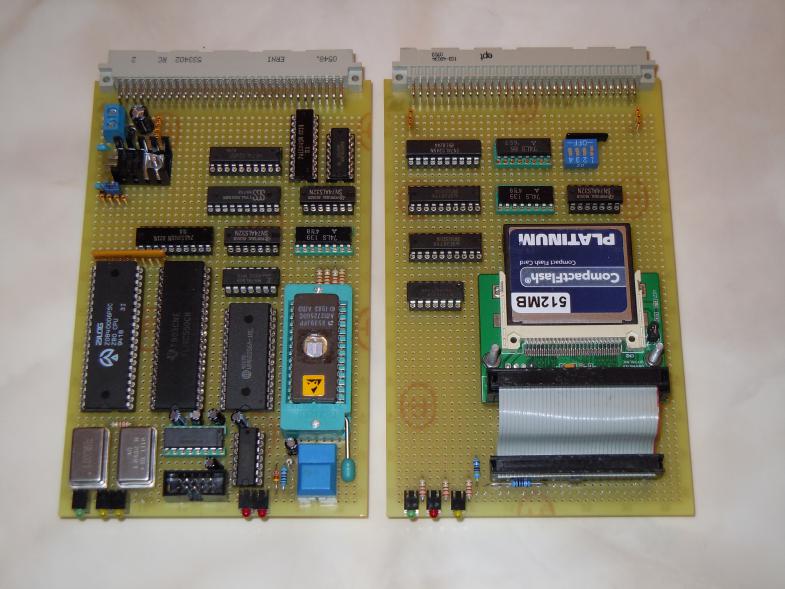
In September 2011 I somehow got the feeling that I just HAD to build a small Z80 based computer again. My last homebrew Z80 was built when I was still in school (more than 20 years ago) and somehow I felt a bit nostalgic and missed the (truly) good old times when computers were small, rather simple, easy to understand and program. Times when writing software meant writing assembler code and not installing several GB of a development package which creates files no smaller than several MB. So I searched for useable parts in my hardware repository and found everything necessary to build a small (tiny, in fact) Z80 based computer. Since I love wire wrapping, I decided to build the computer on a single Euro card using wire wrap sockets where ever possible (if you happen to have wire wrap sockets or wire etc. and would like to give it to a good home I would love to take care of it - I am running low on wire wrap parts and it is next to impossible to find new sockets etc.). Designing and building the card took two evenings of about 5 hours each, and debugging took another, third evening (there were only four wiring errors but I made a software error in configuring the UART which was a bit hard to find). The left row of the board shown above contains the TTL clock oscillators for the Z80 CPU (4 MHz) and the 16C550 UART (1.8432 MHz), a MAX232 for the serial line, a 74LS14 for the (simple) reset circuit and the reset push button. The next row contains the Z80 CPU, the 16C550 UART, a 62256 32kB RAM and a 27(C)512 32kB EPROM in a ZIF socket. The remainder of the board contains a simple voltage regulator with a 7805, several bus drivers (74LS245) and some address select logic. The following pictures give an impression of the process of building this simple computer: |
|
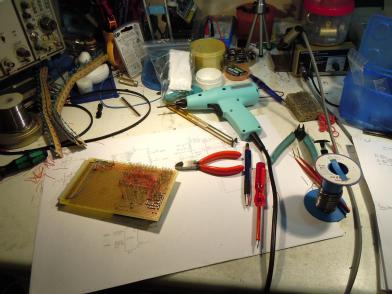
|
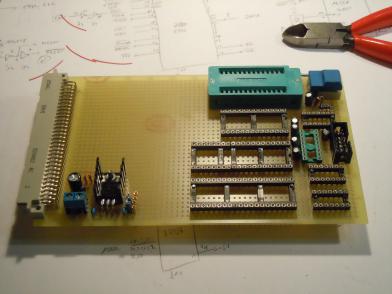
|
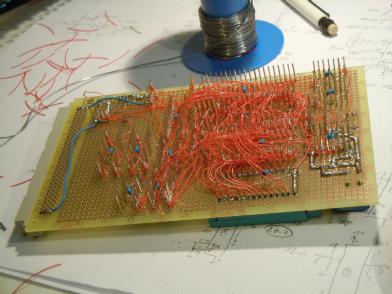
|
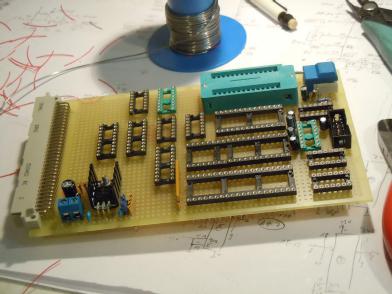
|
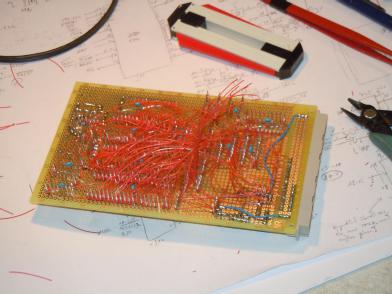
|
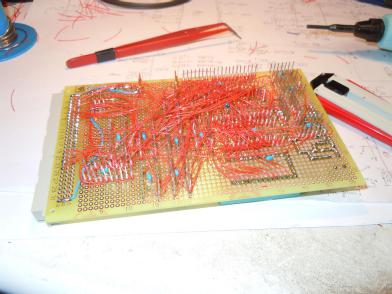
|
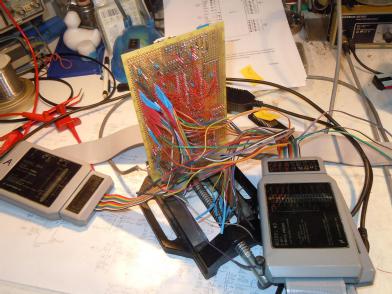
|
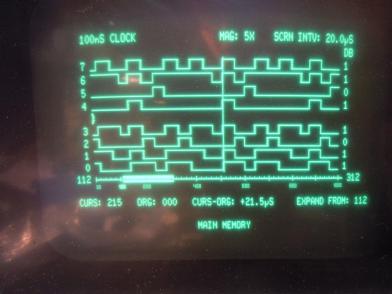
|
|
The schematic of the computer is quite simple and straight forward. Since I wanted to build a really simple computer, there is no provision for DMA transfers and the interrupt logic has not been tested by now. Please note that there is a tiny error in the schematic drawing: The TTL oscillator driving the UART is a 1.8432 MHz type and not an 8 MHz oscillator as noted in the drawing! (Sorry - I forgot to correct this.) |
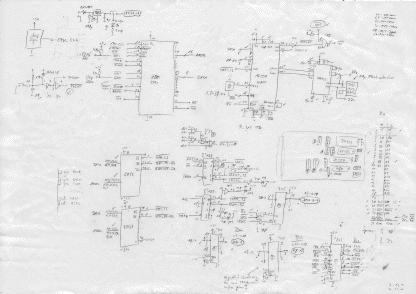
|
|
Here is the parts list for the computer (excluding sockets - I recommend to use precision sockets):
As stylish as a paper tape reader/puncher or at least a cassette drive would be, I decided to implement a simple IDE interface to use cheap and ruggedized Compact Flash cards for mass storage. After reading quite a bit about the IDE interface and having a look at other people's interfaces, I decided not to reinvent the wheel and implement the controlled developed by Phil from Retroleum since his design is clean and simple and features a really nice flipflop logic to generate the various control signals instead of RC delay circuits etc. as found in other designs. |
|
|
The picture on the right shows the schematic of the IDE controller. Please note that there is an error that I forgot to correct on the schematic: The two eight bit latches on the lower right are of type 74LS374 and NOT (!) 74LS574 as written. (74LS574 would work, too, but have a completely different pinout!) The circuit is described in detail on Phil's page at Retroleum. My implementation only differs with respect to an additional address decoder build around a 74LS85 4 bit comparator and a four place DIP switch. Currently my IDE controller is located at address $10 in the IO address space of the Z80 processor. |
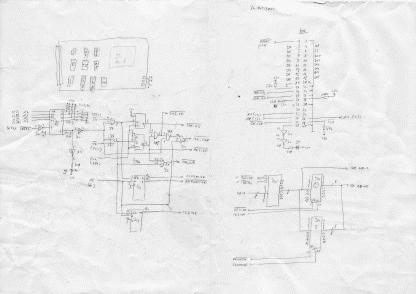
|
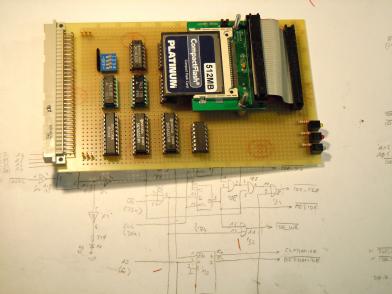
|
The picture on the left shows the completed IDE controller (which drove me nuts during debugging since I managed to handle the two select signals for the IDE devices incorrectly... *sigh*). |
|
Since the tiny Z80 computer consists of two boards by now, an enclosure was needed. I decided to use a 10 inch standard enclosure (had I known before how much fiddling would be required to build the enclosure out of the many parts delivered by my supplier, I might have settled for something else :-) ). The picture on the right shows the first picture of the CPU card in its new housing. The iPad is used as terminal (a very useful feature :-) ). |
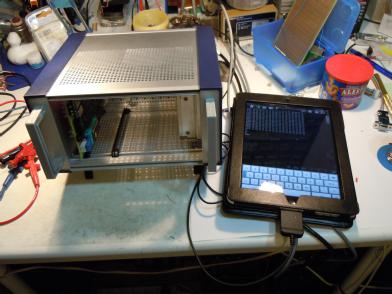
|
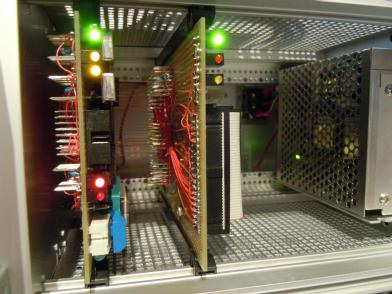
|
The picture on the left shows both cards, the CPU board on the far left and the IDE controller right next to it, in operation. By the way - at first I thought about building a simple power supply with a linear regulator - then I wondered if I should use an old PC power supply and then I realized that new switching power supplies, capable of delivering 5V with 8A, cost only about 18 EUR... That is the reason for the small and modern power supply on the right hand side of the enclosure. |
|
While the processor card worked quite right out of the box, the IDE controller was bit of a challenge since there were two independent bugs buried in its logic. The first problem was that the 74LS32 quad OR gate chip was defective (this is all the more puzzling since it was a new device). But more difficult to find was a mistake I did concerning the two select lines of the IDE device. I "thought" that I had understood the IDE logic and wired one of the /CS-lines to ground as I would have done with any TTL chip requiring two chip select lines. I did not realize that the two /CS lines act in fact as yet another address line and allow access to the upper registers of the IDE device. Fixing this bug was extremely simple, but finding it was hard since I was so sure that grounding the second /CS line was the right thing to do. :-) |
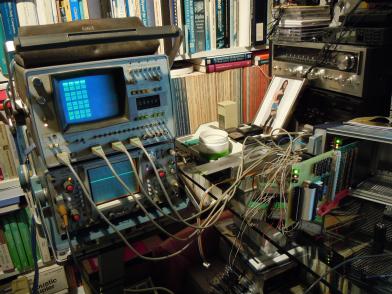
|
|
In order to make any use at all of such a small homebrew computer one needs a small operating system, a so called "monitor" in fact. Writing the monitor took another couple of evenings up to now. Currently it occupies $166C bytes of memory (5740 bytes), so the 32 kB EPROM is not really well utilized at the moment. :-) The monitor is quite simple: All commands are collected into functional groups like CONTROL, DISK etc. The first letter typed at the command prompt selects the desired group while the second letter selects the command to be executed. The FAT file system implementation currently only supports reading files and displaying directory listings but this simplifies development a lot since one can now cross assemble/compile on another system and transfer the binaries by means of a CompactFlash card. :-) Currently the monitor supports the following commands:
Working with this simple monitor looks like this:
Simple Z80-monitor - V 0.8 (B. Ulmann, Sep. 2011 - Jan. 2012)
Cold start, clearing memory.
Z> DISK/MOUNT
FATNAME: MSDOS5.0
CLUSIZ: 40
RESSEC: 0008
FATSEC: 00F0
ROOTLEN: 0200
PSIZ: 003C0030
PSTART: 00001F80
FAT1START: 00001F88
ROOTSTART: 00002168
DATASTART: 00002188
Z> FILE/DIRECTORY
Directory contents:
-------------------------------------------
FILENAME.EXT DIR? SIZE (BYTES) 1ST SECT
-------------------------------------------
_~1 .TRA 00001000 000021C8
TRASHE~1. DIR 00000000 00002188
SPOTLI~1. DIR 00000000 00002208
FSEVEN~1. DIR 00000000 00002408
TEST .TXT 00000013 00002688
FAT_1 .ASM 0000552C 000026C8
MEMO .TXT 00000098 00002748
TEST210 .TXT 00000210 00002788
TEST1F0 .TXT 000001F0 00002DC8
TEST200 .TXT 00000200 00002E08
GROSS .TXT 0000CB5A 00003488
Z> FILE/CAT: FILENAME=TEST.TXT
123 ich bin so frei
Z> FILE/LOAD FILE: ADDR=C000 FILENAME=TEST.TXT
0013 bytes loaded.
Z> MEMORY/DUMP: START=C000 END=C01F
C000: 31 32 33 20 69 63 68 20 62 69 6E 20 73 6F 20 66 123 ich bin so f
C010: 72 65 69 00 00 00 00 00 00 00 00 00 00 00 00 00 rei.............
Z>
The source of the monitor can be found here:
;******************************************************************************
;
; Small monitor for the Z80 single board computer consisting of 32 kB ROM
; ($0000 to $ffff), 32 kB RAM ($8000 to $ffff) and a 16c550 UART.
;
; B. Ulmann, 28-SEP-2011, 29-SEP-2011, 01-OCT-2011, 02-OCT-2011, 30-OCT-2011,
; 01-NOV-2011, 02-NOV-2011, 03-NOV-2011, 06/07/08-JAN-2012
; I. Kloeckl, 06/07/08-JAN-2012 (FAT implementation for reading files)
; B. Ulmann, 14-JAN-2011,
;
; Version 0.8
;
;******************************************************************************
;
; TODO:
; Read and print IDE error status codes in case of error!
;
; Known issues:
; Memory Dump has a problem when the end address is >= FF00
;
;******************************************************************************
;
; RST $00 will enter the monitor (do not care about the return address pushed
; onto the stack - the stack pointer will be reinitialized during cold as well
; as during warm starts.
;
; Monitor routines will generally called by placing the necessary parameters
; into some processor registers and then issuing RST $08. More about this later.
;
; Memory layout is as follows:
;
; +-------+
; ! $FFFF ! General purpose 512 byte buffer
; ! --- !
; ! $FE00 !
; +-------+
; ! $DFFF ! FAT control block
; ! --- !
; ! $FDDC !
; +-------+
; ! $FDDB ! File control block
; ! --- !
; ! $FBBE !
; +-------+
; ! $FBBD ! 81 byte string buffer
; ! --- !
; ! $FB6D !
; +-------+
; ! $FB6C ! 12 byte string buffer
; ! --- !
; ! $FB61 !
; +-------+
; ! $FB60 ! Buffers for various routines
; ! --- !
; ! $FB4D !
; +-------+
; ! $FB4C ! Cold/warm start control (1 byte)
; +-------+
; ! $FBBD ! Stack
; ! ... !
; ! $8000 ! Begin of RAM
; +-------+
; ! $7FFF ! ROM area
; ! --- ! RST $08 calls a system routine
; ! $0000 ! RST $00 restarts the monitor
; +-------+
;
;
monitor_start equ $0000 ; $0000 -> ROM, $8000 -> Test image
;
org monitor_start
;
rom_start equ $0
rom_end equ $7fff
ram_start equ $8000
ram_end equ $ffff
buffer equ ram_end - $1ff ; 512 byte IDE general purpose buffer
;
; Define the FAT control block memory addresses:
;
datastart equ buffer - 4 ; Data area start vector
rootstart equ datastart - 4 ; Root directory start vector
fat1start equ rootstart - 4 ; Start vector to first FAT
psiz equ fat1start - 4 ; Size of partition (in sectors)
pstart equ psiz - 4 ; First sector of partition
rootlen equ pstart - 2 ; Maximum number of entries in directory
fatsec equ rootlen - 2 ; FAT size in sectors
ressec equ fatsec - 2 ; Number of reserved sectors
clusiz equ ressec - 1 ; Size of a cluster (in sectors)
fatname equ clusiz - 9 ; Name of the FAT (null terminated)
fatcb equ fatname ; Start of the FATCB
;
; Define a file control block (FCB) memory addresses and displacements:
;
file_buffer equ fatcb - $200 ; 512 byte sector buffer
cluster_sector equ file_buffer - 1 ; Current sector in cluster
current_sector equ cluster_sector - 4 ; Current sector address
current_cluster equ current_sector - 2 ; Current cluster number
file_pointer equ current_cluster - 4 ; Pointer for file position
file_type equ file_pointer - 1 ; 0 -> not found, else OK
first_cluster equ file_type - 2 ; First cluster of file
file_size equ first_cluster - 4 ; Size of file
file_name equ file_size - 12 ; Canonical name of file
fcb equ file_name ; Start of the FCB
;
fcb_filename equ 0
fcb_file_size equ $c
fcb_first_cluster equ $10
fcb_file_type equ $12
fcb_file_pointer equ $13
fcb_current_cluster equ $17
fcb_current_sector equ $19
fcb_cluster_sector equ $1d
fcb_file_buffer equ $1e
;
; We also need some general purpose string buffers:
;
string_81_bfr equ fcb - 81
string_12_bfr equ string_81_bfr - 12
;
; A number of routines need a bit of scratch RAM, too. Since these are
; sometimes interdependent, each routine gets its own memory cells (only
; possible since the routines are not recursive).
;
load_file_scrat equ string_12_bfr - 2 ; Two bytes for load_file
str2filename_de equ load_file_scrat - 2 ; Two bytes for str2filename
fopen_eob equ str2filename_de - 2 ; Eight bytes for fopen
fopen_rsc equ fopen_eob - 4
fopen_scr equ fopen_rsc - 2
dirlist_scratch equ fopen_scr - 2 ; Eight bytes for fopen
dirlist_eob equ dirlist_scratch - 2
dirlist_rootsec equ dirlist_eob - 4
;
start_type equ dirlist_rootsec - $1 ; Distinguish cold/warm start
;
uart_base equ $0
ide_base equ $10
;
uart_register_0 equ uart_base + 0
uart_register_1 equ uart_base + 1
uart_register_2 equ uart_base + 2
uart_register_3 equ uart_base + 3
uart_register_4 equ uart_base + 4
uart_register_5 equ uart_base + 5
uart_register_6 equ uart_base + 6
uart_register_7 equ uart_base + 7
;
eos equ $00 ; End of string
cr equ $0d ; Carriage return
lf equ $0a ; Line feed
space equ $20 ; Space
tab equ $09 ; Tabulator
;
; Main entry point (RST 00H):
;
rst_00 di ; Disable interrupts
jr initialize ; Jump over the RST-area
;
; RST-area - here is the main entry point into the monitor. The calling
; standard looks like this:
;
; 1) Set register IX to the number of the system routine to be called.
; 2) Set the remaining registers according to the routine's documentation.
; 3) Execute RST $08 to actually call the system routine.
; 4) Evaluate the values returned in the registers as described by the
; Routine's documentation.
;
; (Currently there are no plans to use more RST entry points, so this routine
; just runs as long as necessary in memory. If more RSTs will be used, this
; routine should to be moved to the end of the used ROM area with only a
; simple jump at the RST $08-location.)
;
; This technique of calling system routines can be used as the following
; example program that just echos characters read from the serial line
; demonstrates:
;
; org $8000 ; Start in lower RAM
; loop ld ix, 5 ; Prepare call to getc
; rst 08 ; Execute getc
; cp 3 ; CTRL-C pressed?
; jr z, exit ; Yes - exit
; ld ix, 6 ; Prepare call to putc
; rst 08 ; Execute putx
; jr loop ; Process next character
; exit ld ix, 4 ; Exit - print a CR/LF pair
; rst 08 ; Call CRLF
; ld hl, msg ; Pointer to exit message
; ld ix, 7 ; Prepare calling puts
; rst 08 ; Call puts
; rst 00 ; Restart monitor (warm start)
; msg defb "That's all folks.", $d, $a, 0
;
; Currently the following functions are available (a more detailed description
; can be found in the dispatch table itself):
;
; 0: cold_start
; 1: is_hex
; 2: is_print
; 3: to_upper
; 4: crlf
; 5: getc
; 6: putc
; 7: puts
; 8: strcmp
; 9: gets
; A: fgetc
; B: dump_fcb
; C: fopen
; D: dirlist
; E: fatmount
; F: fatunmount
;
; org monitor_start + $08
nop ; Beware: zasm is buggy concerning
nop ; the org pseudo-statement. Therefore
nop ; The displacement to the RST $08
nop ; entry point is generated by this
nop ; NOP-sequence.
rst_08 push bc ; Save bc and hl
push hl
push ix ; Copy the contents of ix
pop hl ; into hl
add hl, hl ; Double to get displacement in table
ld bc, dispatch_table
add hl, bc ; Calculate displacement in table
ld bc, (hl) ; Load bc with the destination address
push bc
pop ix ; Load ix with the destination address
pop hl ; Restore hl
pop bc ; and bc
jp (ix) ; Jump to the destination routine
dispatch_table defw cold_start ; $00 = clear etc.
; Parameters: N/A
; Action: Performs a cold start (memory is cleared!)
; Return values: N/A
;
defw is_hex
; Parameters: A contains a character code
; Action: Tests ('0' <= A <= '9) || ('A' <= A <= 'F')
; Return values: Carry bit is set if A contains a hex char.
;
defw is_print
; Parameters: A contains a charater code
; Action: Tests if the character is printable
; Return values: Carry bit is set if A contains a valid char.
;
defw to_upper
; Parameters: A contains a character code
; Action: Converts an ASCII character into upper case
; Return values: Converted character code in A
;
defw crlf
; Parameters: N/A
; Action: Sends a CR/LF to the serial line
; Return values: N/A
;
defw getc
; Parameters: A contains a character code
; Action: Reads a character code from the serial line
; Return values: N/A
;
defw putc
; Parameters: A contains a character code
; Action: Sends the character code to the serial line
; Return values: N/A
;
defw puts
; Parameters: HL contains the address of a 0-terminated
; string
; Action: Send the string to the serial line (excluding
; the termination byte, of course)
; Return values: N/A
;
defw strcmp
; Parameters: HL and DE contain the addresses of two strings
; Action: Compare both strings.
; Return values: A contains return value, <0 / 0 / >0
;
defw gets
; Parameters: HL contains a buffer address, B contains the
; buffer length (including the terminating
; null byte!)
; Action: Reads a string from STDIN. Terminates when
; either the buffer is full or the string is
; terminated by CR/LF.
; Return values: N/A
;
defw fgetc
; Parameters: IY (pointer to a valid FCB)
; Action: Reads a character from a FAT file
; Return values: Character in A, if EOF has been encountered,
; the carry flag will be set
;
defw dump_fcb
; Parameters: IY (pointer to a valid FCB)
; Action: Prints the contents of the FCB in human
; readable format to STDOUT
; Return values: N/A
;
defw fopen
; Parameters: HL (points to a buffer containing the file
; file name), IY (points to an empty FCB)
; Action: Opens a file for reading
; Return values: N/A (All information is contained in the FCB)
;
defw dirlist
; Parameters: N/A (relies on a valid FAT control block)
; Action: Writes a directory listing to STDOUT
; Return values: N/A
;
defw fatmount
; Parameters: N/A (needs the global FAT control block)
; Action: Mounts a disk (populates the FAT CB)
; Return values: N/A
;
defw fatunmount
; Parameters: N/A (needs the global FAT control block)
; Action: Invalidates the global FAT control block
; Return values; N/A
;
; The stackpointer will be predecremented by a push instruction. Since we need
; a 512 byte buffer for data transfers to and from the IDE disk, the stack
; pointer is initialized to start at the beginning of this buffer space.
;
initialize ld sp, start_type - $1
;
; Initialize UART to 9600,8N1:
;
ld a, $80
out (uart_register_3), a
ld a, $c ; 1843200 / (16 * 9600)
out (uart_register_0), a
xor a
out (uart_register_1), a
ld a, $3 ; 8N1
out (uart_register_3), a
;
; Print welcome message:
;
ld hl, hello_msg
call puts
;
; If this is a cold start (the location start_type does not contain $aa)
; all available RAM will be reset to $00 and a message will be printed.
;
ld a, (start_type)
cp $aa ; Warm start?
jr z, main_loop ; Yes - enter command loop
ld hl, cold_start_msg
call puts ; Print cold start message
ld hl, ram_start ; Start of block to be filled with $00
ld de, hl ; End address of block
inc de ; plus 1 (for ldir)
ld bc, ram_end - ram_start
ld (hl), $00 ; Load first memory location
ldir ; And copy this value down
ld hl, start_type
ld (hl), $aa ; Cold start done, remember this
;
; Read characters from the serial line and send them just back:
;
main_loop ld hl, monitor_prompt
call puts
; The monitor is rather simple: All commands are just one or two letters.
; The first character selects a command group, the second the desired command
; out of that group. When a command is recognized, it will be spelled out
; automatically and the user will be prompted for arguments if applicable.
call monitor_key ; Read a key
; Which group did we get?
cp 'C' ; Control group?
jr nz, disk_group ; No - test next group
ld hl, cg_msg ; Print group prompt
call puts
call monitor_key ; Get command key
cp 'C' ; Cold start?
jp z, cold_start
cp 'W' ; Warm start?
jp z, warm_start
cp 'S' ; Start?
jp z, start
cp 'I' ; Info?
call z, info
jr z, main_loop
jp cmd_error ; Unknown control-group-command
disk_group cp 'D' ; Disk group?
jr nz, file_group ; No - file group?
ld hl, dg_msg ; Print group prompt
call puts
call monitor_key ; Get command
cp 'I' ; Info?
call z, disk_info
jr z, main_loop
cp 'M' ; Mount?
call z, mount
jr z, main_loop
cp 'T' ; Read from disk?
call z, disk_transfer
jr z, main_loop
cp 'U' ; Unmount?
call z, unmount
jr z, main_loop
jr cmd_error ; Unknown disk-group-command
file_group cp 'F' ; File group?
jr nz, help_group ; No - help group?
ld hl, fg_msg ; Print group prompt
call puts
call monitor_key ; Get command
cp 'C' ; Cat?
call z, cat_file
jr z, main_loop
cp 'D' ; Directory?
call z, directory
jr z, main_loop
cp 'L' ; Load?
call z, load_file
jr z, main_loop
jr cmd_error ; Unknown file-group-command
help_group cp 'H' ; Help? (No further level expected.)
call z, help ; Yes :-)
jp z, main_loop
memory_group cp 'M' ; Memory group?
jp nz, group_error ; No - print an error message
ld hl, mg_msg ; Print group prompt
call puts
call monitor_key ; Get command key
cp 'D' ; Dump?
call z, dump
jp z, main_loop
cp 'E' ; Examine?
call z, examine
jp z, main_loop
cp 'F' ; Fill?
call z, fill
jp z, main_loop
cp 'I' ; INTEL-Hex load?
call z, ih_load
jp z, main_loop
cp 'L' ; Load?
call z, load
jp z, main_loop
cp 'M' ; Move?
call z, move
jp z, main_loop
cp 'R' ; Register dump?
call z, rdump
jp z, main_loop
jr cmd_error ; Unknown memory-group-command
group_error ld hl, group_err_msg
jr print_error
cmd_error ld hl, command_err_msg
print_error call putc ; Echo the illegal character
call puts ; and print the error message
jp main_loop
;
; Some constants for the monitor:
;
hello_msg defb cr, lf, cr, lf, "Simple Z80-monitor - V 0.8 "
defb "(B. Ulmann, Sep. 2011 - Jan. 2012)", cr, lf, eos
monitor_prompt defb cr, lf, "Z> ", eos
cg_msg defb "CONTROL/", eos
dg_msg defb "DISK/", eos
fg_msg defb "FILE/", eos
mg_msg defb "MEMORY/", eos
command_err_msg defb ": Syntax error - command not found!", cr, lf, eos
group_err_msg defb ": Syntax error - group not found!", cr, lf, eos
cold_start_msg defb "Cold start, clearing memory.", cr, lf, eos
;
; Read a key for command group and command:
;
monitor_key call getc
cp lf ; Ignore LF
jr z, monitor_key ; Just get the next character
call to_upper
cp cr ; A CR will return to the prompt
ret nz ; No - just return
inc sp ; Correct SP to and avoid ret!
jp main_loop
;
;******************************************************************************
;***
;*** The following routines are used in the interactive part of the monitor
;***
;******************************************************************************
;
; Print a file's contents to STDOUT:
;
cat_file push bc
push de
push hl
push iy
ld hl, cat_file_prompt
call puts
ld hl, string_81_bfr
ld b, 81
call gets ; Read the filename into buffer
ld iy, fcb ; Prepare fopen (only one FCB currently)
ld de, string_12_bfr
call fopen
cat_file_loop call fgetc ; Get a single character
jr c, cat_file_exit
call putc ; Print character if not EOF
jr cat_file_loop ; Next character
cat_file_exit pop iy
pop hl
pop de
pop bc
ret
cat_file_prompt defb "CAT: FILENAME=", eos
;
; directory - a simple wrapper for dirlist (necessary for printing the command
; name)
;
directory push hl
ld hl, directory_msg
call puts
call dirlist
pop hl
ret
directory_msg defb "DIRECTORY", cr, lf, eos
;
; Get and print disk info:
;
disk_info push af
push hl
ld hl, disk_info_msg
call puts
call ide_get_id ; Read the disk info into the IDE buffer
ld hl, buffer + $13
ld (hl), tab
call puts ; Print vendor information
call crlf
ld hl, buffer + $2d
ld (hl), tab
call puts
call crlf
pop hl
pop af
ret
disk_info_msg defb "INFO:", cr, lf, eos
;
; Read data from disk to memory
;
disk_transfer push af
push bc
push de
push hl
push ix
ld hl, disk_trx_msg_0
call puts ; Print Read/Write prompt
disk_trx_rwlp call getc
call to_upper
cp 'R' ; Read?
jr nz, disk_trx_nr ; No
ld ix, ide_rs ; Yes, we will call ide_rs later
ld hl, disk_trx_msg_1r
jr disk_trx_main ; Prompt the user for parameters
disk_trx_nr cp 'W' ; Write?
jr nz, disk_trx_rwlp
ld ix, ide_ws ; Yes, we will call ide_ws later
ld hl, disk_trx_msg_1w
disk_trx_main call puts ; Print start address prompt
call get_word ; Get memory start address
push hl
ld hl, disk_trx_msg_2
call puts ; Prompt for number of blocks
call get_byte ; There are only 128 block of memory!
cp 0 ; Did the user ask for 00 blocks?
jr nz, disk_trx_1 ; No, continue prompting
ld hl, disk_trx_msg_4
call puts
jr disk_trx_exit
disk_trx_1 ld hl, disk_trx_msg_3
call puts ; Prompt for disk start sector
call get_word ; This is a four byte address!
ld bc, hl
call get_word
ld de, hl
pop hl ; Restore memory start address
; Register contents:
; A: Number of blocks
; BC: LBA3/2
; DE: LBA1/0
; HL: Memory start address
disk_trx_loop push af ; Save number of sectors
call disk_trampoline ; Read/write one sector (F is changed!)
push hl ; Save memory address
push bc ; Save LBA3/2
ld hl, de ; Increment DE (LBA1/0)
ld bc, $0001 ; by one and
add hl, bc ; generate a carry if necessary
ld de, hl ; Save new LBA1/0
pop hl ; Restore LBA3/2 into HL (!)
jr nc, disk_trx_skip
add hl, bc ; Increment BC if there was a carry
disk_trx_skip ld bc, hl ; Write new LBA3/2 into BC
pop hl ; Restore memory address
push bc ; Save LBA3/2
ld bc, $200 ; 512 byte per block
add hl, bc ; Set pointer to next memory block
pop bc ; Restore LBA3/2
pop af
dec a ; One block already done
jr nz, disk_trx_loop
disk_trx_exit pop ix
pop hl
pop de
pop bc
pop af
ret
disk_trampoline jp (ix)
disk_trx_msg_0 defb "TRANSFER/", eos
disk_trx_msg_1r defb "READ: ", cr, lf, " MEMORY START=", eos
disk_trx_msg_1w defb "WRITE: ", cr, lf, " MEMORY START=", eos
disk_trx_msg_2 defb " NUMBER OF BLOCKS (512 BYTE)=", eos
disk_trx_msg_3 defb " START SECTOR=", eos
disk_trx_msg_4 defb " Nothing to do for zero blocks.", cr, lf, eos
;
; Dump a memory area
;
dump push af
push bc
push de
push hl
ld hl, dump_msg_1
call puts ; Print prompt
call get_word ; Read start address
push hl ; Save start address
ld hl, dump_msg_2 ; Prompt for end address
call puts
call get_word ; Get end address
call crlf
inc hl ; Increment stop address for comparison
ld de, hl ; DE now contains the stop address
pop hl ; HL is the start address again
; This loop will dump 16 memory locations at once - even
; if this turns out to be more than requested.
dump_line ld b, $10 ; This loop will process 16 bytes
push hl ; Save HL again
call print_word ; Print address
ld hl, dump_msg_3 ; and a colon
call puts
pop hl ; Restore address
push hl ; We will need HL for the ASCII dump
dump_loop ld a, (hl) ; Get the memory content
call print_byte ; and print it
ld a, ' ' ; Print a space
call putc
inc hl ; Increment address counter
djnz dump_loop ; Continue with this line
; This loop will dump the very same 16 memory locations - but
; this time printable ASCII characters will be written.
ld b, $10 ; 16 characters at a time
ld a, ' ' ; We need some spaces
call putc ; to print
call putc
pop hl ; Restore the start address
dump_ascii_loop ld a, (hl) ; Get byte
call is_print ; Is it printable?
jr c, dump_al_1 ; Yes
ld a, '.' ; No - print a dot
dump_al_1 call putc ; Print the character
inc hl ; Increment address to read from
djnz dump_ascii_loop
; Now we are finished with printing one line of dump output.
call crlf ; CR/LF for next line on terminal
push hl ; Save the current address for later
and a ; Clear carry
sbc hl, de ; Have we reached the last address?
pop hl ; restore the address
jr c, dump_line ; Dump next line of 16 bytes
pop hl
pop de
pop bc
pop af
ret
dump_msg_1 defb "DUMP: START=", eos
dump_msg_2 defb " END=", eos
dump_msg_3 defb ": ", eos
;
; Examine a memory location:
;
examine push af
push hl
ld hl, examine_msg_1
call puts
call get_word ; Wait for a four-nibble address
push hl ; Save address for later
ld hl, examine_msg_2
call puts
examine_loop pop hl ; Restore address
ld a, (hl) ; Get content of address
inc hl ; Prepare for next examination
push hl ; Save hl again for later use
call print_byte ; Print the byte
call getc ; Get a character
cp ' ' ; A blank?
jr nz, examine_exit; No - exit
ld a, ' ' ; Print a blank character
call putc
jr examine_loop
examine_exit pop hl ; Get rid of save hl value
call crlf ; Print CR/LF
pop hl
pop af
ret
examine_msg_1 defb "EXAMINE (type ' '/RET): ADDR=", eos
examine_msg_2 defb " DATA=", eos
;
; Fill a block of memory with a single byte - the user is prompted for the
; start address, the length of the block and the fill value.
;
fill push af ; We will need nearly all registers
push bc
push de
push hl
ld hl, fill_msg_1 ; Prompt for start address
call puts
call get_word ; Get the start address
push hl ; Store the start address
and a ; Clear carry
ld bc, ram_start
sbc hl, bc ; Is the address in the RAM area?
jr nc, fill_get_length
ld hl, fill_msg_4 ; No!
call puts ; Print error message
pop hl ; Clean up the stack
jr fill_exit ; Leave routine
fill_get_length ld hl, fill_msg_2 ; Prompt for length information
call puts
call get_word ; Get the length of the block
; Now make sure that start + length is still in RAM:
ld bc, hl ; BC contains the length
pop hl ; HL now contains the start address
push hl ; Save the start address again
push bc ; Save the length
add hl, bc ; Start + length
and a ; Clear carry
ld bc, ram_start
sbc hl, bc ; Compare with ram_start
jr nc, fill_get_value
ld hl, fill_msg_5 ; Print error message
call puts
pop bc ; Clean up the stack
pop hl
jr fill_exit ; Leave the routine
fill_get_value ld hl, fill_msg_3 ; Prompt for fill value
call puts
call get_byte ; Get the fill value
pop bc ; Get the length from the stack
pop hl ; Get the start address again
ld de, hl ; DE = HL + 1
inc de
dec bc
; HL = start address
; DE = destination address = HL + 1
; Please note that this is necessary - LDIR does not
; work with DE == HL. :-)
; A = fill value
ld (hl), a ; Store A into first memory location
ldir ; Fill the memory
call crlf
fill_exit pop hl ; Restore the register contents
pop de
pop bc
pop af
ret
fill_msg_1 defb "FILL: START=", eos
fill_msg_2 defb " LENGTH=", eos
fill_msg_3 defb " VALUE=", eos
fill_msg_4 defb " Illegal address!", cr, lf, eos
fill_msg_5 defb " Block exceeds RAM area!", cr, lf, eos
;
; Help
;
help push hl
ld hl, help_msg
call puts
pop hl
ret
help_msg defb "HELP: Known command groups and commands:", cr, lf
defb " C(ontrol group):", cr, lf
defb " C(old start), I(nfo), S(tart), "
defb "W(arm start)", cr, lf
defb " D(isk group):", cr, lf
defb " I(nfo), M(ount), T(ransfer),"
defb " U(nmount)", cr, lf
defb " R(ead), W(rite)"
defb cr, lf
defb " F(ile group):", cr, lf
defb " C(at), D(irectory), L(oad)", cr, lf
defb " H(elp)", cr, lf
defb " M(emory group):", cr, lf
defb " D(ump), E(xamine), F(ill), "
defb "I(ntel Hex Load), L(oad), R(egister dump)"
defb cr, lf, eos
;
; Load an INTEL-Hex file (a ROM image) into memory. This routine has been
; more or less stolen from a boot program written by Andrew Lynch and adapted
; to this simple Z80 based machine.
;
; The INTEL-Hex format looks a bit awkward - a single line contains these
; parts:
; ':', Record length (2 hex characters), load address field (4 hex characters),
; record type field (2 characters), data field (2 * n hex characters),
; checksum field. Valid record types are 0 (data) and 1 (end of file).
;
; Please note that this routine will not echo what it read from stdin but
; what it "understood". :-)
;
ih_load push af
push de
push hl
ld hl, ih_load_msg_1
call puts
ih_load_loop call getc ; Get a single character
cp cr ; Don't care about CR
jr z, ih_load_loop
cp lf ; ...or LF
jr z, ih_load_loop
cp space ; ...or a space
jr z, ih_load_loop
call to_upper ; Convert to upper case
call putc ; Echo character
cp ':' ; Is it a colon?
jr nz, ih_load_error
call get_byte ; Get record length into A
ld d, a ; Length is now in D
ld e, $0 ; Clear checksum
call ih_load_chk ; Compute checksum
call get_word ; Get load address into HL
ld a, h ; Update checksum by this address
call ih_load_chk
ld a, l
call ih_load_chk
call get_byte ; Get the record type
call ih_load_chk ; Update checksum
cp $1 ; Have we reached the EOF marker?
jr nz, ih_load_data; No - get some data
call get_byte ; Yes - EOF, read checksum data
call ih_load_chk ; Update our own checksum
ld a, e
and a ; Is our checksum zero (as expected)?
jr z, ih_load_exit ; Yes - exit this routine
ih_load_chk_err ld hl, ih_load_msg_3
call puts ; No - print an error message
jr ih_load_exit ; and exit
ih_load_data ld a, d ; Record length is now in A
and a ; Did we process all bytes?
jr z, ih_load_eol ; Yes - process end of line
call get_byte ; Read two hex digits into A
call ih_load_chk ; Update checksum
ld (hl), a ; Store byte into memory
inc hl ; Increment pointer
dec d ; Decrement remaining record length
jr ih_load_data ; Get next byte
ih_load_eol call get_byte ; Read the last byte in the line
call ih_load_chk ; Update checksum
ld a, e
and a ; Is the checksum zero (as expected)?
jr nz, ih_load_chk_err
call crlf
jr ih_load_loop ; Yes - read next line
ih_load_error ld hl, ih_load_msg_2
call puts ; Print error message
ih_load_exit call crlf
pop hl ; Restore registers
pop de
pop af
ret
;
ih_load_chk ld c, a ; All in all compute E = E - A
ld a, e
sub c
ld e, a
ld a, c
ret
ih_load_msg_1 defb "INTEL HEX LOAD: ", eos
ih_load_msg_2 defb " Syntax error!", eos
ih_load_msg_3 defb " Checksum error!", eos
;
; Print version information etc.
;
info push hl
ld hl, info_msg
call puts
ld hl, hello_msg
call puts
pop hl
ret
info_msg defb "INFO: ", eos
;
; Load data into memory. The user is prompted for a 16 bit start address. Then
; a sequence of bytes in hexadecimal notation may be entered until a character
; that is not 0-9 or a-f is encountered.
;
load push af
push bc
push de
push hl
ld hl, load_msg_1 ; Print command name
call puts
call get_word ; Wait for the start address (2 bytes)
push hl ; Remember address
and a ; Clear carry
ld bc, ram_start ; Check if the address is valid
sbc hl, bc ; by subtracting the RAM start address
pop hl ; Restore address
ld de, 0 ; Counter for bytes loaded
jr nc, load_loop ; OK - start reading hex characters
ld hl, load_msg_3 ; Print error message
call puts
jr load_exit
; All in all we need two hex nibbles per byte. If two characters
; in a row are valid hexadecimal digits we will convert them
; to a byte and store this in memory. If one character is
; illegal, the load routine terminates and returns to the
; monitor.
load_loop ld a, ' '
call putc ; Write a space as byte delimiter
call getc ; Read first character
call to_upper ; Convert to upper case
call is_hex ; Is it a hex digit?
jr nc, load_exit ; No - exit the load routine
call nibble2val ; Convert character to value
call print_nibble ; Echo hex digit
rlc a
rlc a
rlc a
rlc a
ld b, a ; Save the upper four bits for later
call getc ; Read second character and proceed...
call to_upper ; Convert to upper case
call is_hex
jr nc, load_exit
call nibble2val
call print_nibble
or b ; Combine lower 4 bits with upper
ld (hl), a ; Save value to memory
inc hl
inc de
jr load_loop ; Get next byte (or at least try to)
load_exit call crlf ; Finished...
ld hl, de ; Print number of bytes loaded
call print_word
ld hl, load_msg_2
call puts
pop hl
pop de
pop bc
pop af
ret
load_msg_1 defb "LOAD (xx or else to end): ADDR=", eos
load_msg_2 defb " bytes loaded.", cr, lf, eos
load_msg_3 defb " Illegal address!", eos
;
; Load a file's contents into memory:
;
load_file push af
push bc
push de
push hl
push iy
ld hl, load_file_msg_1
call puts ; Print first prompt (start address)
call get_word ; Wait for the start address (2 bytes)
ld (load_file_scrat), hl
and a ; Clear carry
ld bc, ram_start ; Check if the address is valid
sbc hl, bc ; by subtracting the RAM start address
jr nc, load_file_1
ld hl, load_file_msg_2
call puts
jr load_file_exit ; Illegal address - exit routine
load_file_1 ld hl, load_file_msg_4
call puts ; Prompt for filename
ld hl, string_81_bfr
ld b, 81 ; Buffer length
call gets ; Read file name into bfr
ld iy, fcb ; Prepare open (only one FCB currently)
ld de, string_12_bfr
call fopen ; Open the file (if possible)
ld hl, (load_file_scrat)
ld de, 0 ; Counter for bytes loaded
load_file_loop call fgetc ; Get one byte from the file
jr c, load_file_exit
ld (hl), a ; Store byte and
inc hl ; increment pointer
inc de
jr load_file_loop ; Process next byte
load_file_exit call crlf
ld hl, de ; Print number of bytes loaded
call print_word
ld hl, load_file_msg_3
call puts
pop iy
pop hl
pop de
pop bc
pop af
ret
load_file_msg_1 defb "LOAD FILE: ADDR=", eos
load_file_msg_2 defb " Illegal address!", eos
load_file_msg_3 defb " bytes loaded.", cr, lf, eos
load_file_msg_4 defb " FILENAME=", eos
;
; mount - a wrapper for fatmount (necessary for printing the command's name)
;
mount push hl
ld hl, mount_msg
call puts
call fatmount
pop hl
ret
mount_msg defb "MOUNT", cr, lf, cr, lf, eos
;
; Move a memory block - the user is prompted for all necessary data:
;
move push af ; We won't even destroy the flags!
push bc
push de
push hl
ld hl, move_msg_1
call puts
call get_word ; Get address of block to be moved
push hl ; Push this address
ld hl, move_msg_2
call puts
call get_word ; Get destination start address
ld de, hl ; LDIR requires this in DE
; Is the destination address in RAM area?
and a ; Clear carry
ld bc, ram_start
sbc hl, bc ; Is the destination in RAM?
jr nc, move_get_length
ld hl, move_msg_4 ; No - print error message
call puts
pop hl ; Clean up stack
jr move_exit
move_get_length ld hl, move_msg_3
call puts
call get_word ; Get length of block
ld bc, hl ; LDIR requires the length in BC
pop hl ; Get address of block to be moved
; I was lazy - there is no test to make sure that the block
; to be moved will fit into the RAM area.
ldir ; Move block
move_exit call crlf ; Finished
pop hl ; Restore registers
pop de
pop bc
pop af
ret
move_msg_1 defb "MOVE: FROM=", eos
move_msg_2 defb " TO=", eos
move_msg_3 defb " LENGTH=", eos
move_msg_4 defb " Illegal destination address!", eos
;
; Dump the contents of both register banks:
;
rdump push af
push hl
ld hl, rdump_msg_1 ; Print first two lines
call puts
pop hl
call rdump_one_set
exx
ex af, af'
push hl
ld hl, rdump_msg_2
call puts
pop hl
call rdump_one_set
ex af, af'
exx
push hl
ld hl, rdump_msg_3
call puts
push ix
pop hl
call print_word
ld hl, rdump_msg_4
call puts
push iy
pop hl
call print_word
ld hl, rdump_msg_5
call puts
ld hl, 0
add hl, sp
call print_word
call crlf
pop hl
pop af
ret
rdump_msg_1 defb "REGISTER DUMP", cr, lf, cr, lf, tab, "1st:", eos
rdump_msg_2 defb tab, "2nd:", eos
rdump_msg_3 defb tab, "PTR: IX=", eos
rdump_msg_4 defb " IY=", eos
rdump_msg_5 defb " SP=", eos
;
rdump_one_set push hl ; Print one register set
ld hl, rdump_os_msg_1
call puts
push af ; Move AF into HL
pop hl
call print_word ; Print contents of AF
ld hl, rdump_os_msg_2
call puts
ld hl, bc
call print_word ; Print contents of BC
ld hl, rdump_os_msg_3
call puts
ld hl, de
call print_word ; Print contents of DE
ld hl, rdump_os_msg_4
call puts
pop hl ; Restore original HL
call print_word ; Print contents of HL
call crlf
ret
rdump_os_msg_1 defb " AF=", eos
rdump_os_msg_2 defb " BC=", eos
rdump_os_msg_3 defb " DE=", eos
rdump_os_msg_4 defb " HL=", eos
;
; Start a program - this will prompt for a four digital hexadecimal start
; address. A program should end with "jp $0" to enter the monitor again.
;
start ld hl, start_msg
call puts
call get_word ; Wait for a four-nibble address
call crlf
jp (hl) ; Start program (and hope for the best)
start_msg defb "START: ADDR=", eos
;
; unmount - simple wrapper for fatunmount (necessary for printing the command
; name)
;
unmount push hl
ld hl, unmount_msg
call puts
call fatunmount
pop hl
ret
unmount_msg defb "UNMOUNT", cr, lf, eos
;
;******************************************************************************
;***
;*** String routines
;***
;******************************************************************************
;
; is_hex checks a character stored in A for being a valid hexadecimal digit.
; A valid hexadecimal digit is denoted by a set C flag.
;
is_hex cp 'F' + 1 ; Greater than 'F'?
ret nc ; Yes
cp '0' ; Less than '0'?
jr nc, is_hex_1 ; No, continue
ccf ; Complement carry (i.e. clear it)
ret
is_hex_1 cp '9' + 1 ; Less or equal '9*?
ret c ; Yes
cp 'A' ; Less than 'A'?
jr nc, is_hex_2 ; No, continue
ccf ; Yes - clear carry and return
ret
is_hex_2 scf ; Set carry
ret
;
; is_print checks if a character is a printable ASCII character. A valid
; character is denoted by a set C flag.
;
is_print cp space
jr nc, is_print_1
ccf
ret
is_print_1 cp $7f
ret
;
; nibble2val expects a hexadecimal digit (upper case!) in A and returns the
; corresponding value in A.
;
nibble2val cp '9' + 1 ; Is it a digit (less or equal '9')?
jr c, nibble2val_1 ; Yes
sub 7 ; Adjust for A-F
nibble2val_1 sub '0' ; Fold back to 0..15
and $f ; Only return lower 4 bits
ret
;
; Convert a single character contained in A to upper case:
;
to_upper cp 'a' ; Nothing to do if not lower case
ret c
cp 'z' + 1 ; > 'z'?
ret nc ; Nothing to do, either
and $5f ; Convert to upper case
ret
;
; Compare two null terminated strings, return >0 / 0 / <0 in A, works like
; strcmp. The routine expects two pointer in HL and DE which will be
; preserved.
;
strcmp push de
push hl
strcmp_loop ld a, (de)
cp 0 ; End of first string reached?
jr z, strcmp_exit
cp (hl) ; Compare two characters
jr nz, strcmp_exit ; Different -> exit
inc hl
inc de
jr strcmp_loop
strcmp_exit sub (hl)
pop hl
pop de
ret
;
;******************************************************************************
;***
;*** IO routines
;***
;******************************************************************************
;
; Send a CR/LF pair:
;
crlf push af
ld a, cr
call putc
ld a, lf
call putc
pop af
ret
;
; Read a single character from the serial line, result is in A:
;
getc call rx_ready
in a, (uart_register_0)
ret
;
; Get a byte in hexadecimal notation. The result is returned in A. Since
; the routine get_nibble is used only valid characters are accepted - the
; input routine only accepts characters 0-9a-f.
;
get_byte push bc ; Save contents of B (and C)
call get_nibble ; Get upper nibble
rlc a
rlc a
rlc a
rlc a
ld b, a ; Save upper four bits
call get_nibble ; Get lower nibble
or b ; Combine both nibbles
pop bc ; Restore B (and C)
ret
;
; Get a hexadecimal digit from the serial line. This routine blocks until
; a valid character (0-9a-f) has been entered. A valid digit will be echoed
; to the serial line interface. The lower 4 bits of A contain the value of
; that particular digit.
;
get_nibble call getc ; Read a character
call to_upper ; Convert to upper case
call is_hex ; Was it a hex digit?
jr nc, get_nibble ; No, get another character
call nibble2val ; Convert nibble to value
call print_nibble
ret
;
; Get a word (16 bit) in hexadecimal notation. The result is returned in HL.
; Since the routines get_byte and therefore get_nibble are called, only valid
; characters (0-9a-f) are accepted.
;
get_word push af
call get_byte ; Get the upper byte
ld h, a
call get_byte ; Get the lower byte
ld l, a
pop af
ret
;
; Read a string from STDIN - HL contains the buffer start address,
; B contains the buffer length.
;
gets push af
push bc
push hl
gets_loop call getc ; Get a single character
cp cr ; Skip CR characters
jr z, gets_loop ; only LF will terminate input
call to_upper
call putc ; Echo character
cp lf ; Terminate string at
jr z, gets_exit ; LF or
ld (hl), a ; Copy character to buffer
inc hl
djnz gets_loop
gets_exit ld (hl), 0 ; Insert termination byte
pop hl
pop bc
pop af
ret
;
; print_byte prints a single byte in hexadecimal notation to the serial line.
; The byte to be printed is expected to be in A.
;
print_byte push af ; Save the contents of the registers
push bc
ld b, a
rrca
rrca
rrca
rrca
call print_nibble ; Print high nibble
ld a, b
call print_nibble ; Print low nibble
pop bc ; Restore original register contents
pop af
ret
;
; print_nibble prints a single hex nibble which is contained in the lower
; four bits of A:
;
print_nibble push af ; We won't destroy the contents of A
and $f ; Just in case...
add '0' ; If we have a digit we are done here.
cp '9' + 1 ; Is the result > 9?
jr c, print_nibble_1
add 'A' - '0' - $a ; Take care of A-F
print_nibble_1 call putc ; Print the nibble and
pop af ; restore the original value of A
ret
;
; print_word prints the four hex digits of a word to the serial line. The
; word is expected to be in HL.
;
print_word push hl
push af
ld a, h
call print_byte
ld a, l
call print_byte
pop af
pop hl
ret
;
; Send a single character to the serial line (a contains the character):
;
putc call tx_ready
out (uart_register_0), a
ret
;
; Send a string to the serial line, HL contains the pointer to the string:
;
puts push af
push hl
puts_loop ld a, (hl)
cp eos ; End of string reached?
jr z, puts_end ; Yes
call putc
inc hl ; Increment character pointer
jr puts_loop ; Transmit next character
puts_end pop hl
pop af
ret
;
; Wait for an incoming character on the serial line:
;
rx_ready push af
rx_ready_loop in a, (uart_register_5)
bit 0, a
jr z, rx_ready_loop
pop af
ret
;
; Wait for UART to become ready to transmit a byte:
;
tx_ready push af
tx_ready_loop in a, (uart_register_5)
bit 5, a
jr z, tx_ready_loop
pop af
ret
;
;******************************************************************************
;***
;*** IDE routines
;***
;******************************************************************************
;
ide_data_low equ ide_base + $0
ide_data_high equ ide_base + $8
ide_error_code equ ide_base + $1
;
; Bit mapping of ide_error_code register:
;
; 0: 1 = DAM not found
; 1: 1 = Track 0 not found
; 2: 1 = Command aborted
; 3: Reserved
; 4: 1 = ID not found
; 5: Reserved
; 6: 1 = Uncorrectable ECC error
; 7: 1 = Bad block detected
;
ide_secnum equ ide_base + $2
;
; Typically set to 1 sector to be transf.
;
ide_lba0 equ ide_base + $3
ide_lba1 equ ide_base + $4
ide_lba2 equ ide_base + $5
ide_lba3 equ ide_base + $6
;
; Bit mapping of ide_lba3 register:
;
; 0 - 3: LBA bits 24 - 27
; 4 : Master (0) or slave (1) selection
; 5 : Always 1
; 6 : Set to 1 for LBA access
; 7 : Always 1
;
ide_status_cmd equ ide_base + $7
;
; Useful commands (when written):
;
; $20: Read sectors with retry
; $30: Write sectors with retry
; $EC: Identify drive
;
; Status bits (when read):
;
; 0 = ERR: 1 = Previous command resulted in an error
; 1 = IDX: Unused
; 2 = CORR: Unused
; 3 = DRQ: 1 = Data Request Ready (sector buffer ready)
; 4 = DSC: Unused
; 5 = DF: 1 = Write fault
; 6 = RDY: 1 = Ready to accept command
; 7 = BUSY: 1 = Controller is busy executing a command
;
ide_retries equ $ff ; Number of retries for polls
;
;
; Get ID information from drive. HL is expected to point to a 512 byte byte
; sector buffer. If carry is set, the function did not complete correctly and
; was aborted.
;
ide_get_id push af
push bc
push hl
call ide_ready ; Is the drive ready?
jr c, ide_get_id_err ; No - timeout!
ld a, $a0 ; Master, no LBA addressing
out (ide_status_cmd), a
call ide_ready ; Did the command complete?
jr c, ide_get_id_err ; Timeout!
ld a, $ec ; Command to read ID
out (ide_status_cmd), a ; Write command to drive
call ide_ready ; Can we proceed?
jr c, ide_get_id_err ; No - timeout, propagate carry
call ide_error_check ; Any errors?
jr c, ide_get_id_err ; Yes - something went wrong
call ide_bfr_ready ; Is the buffer ready to read?
jr c, ide_get_id_err ; No
ld hl, buffer ; Load the buffer's address
ld b, $0 ; We will read 256 words
ide_get_id_lp in a, (ide_data_low) ; Read high (!) byte
ld c, a
in a, (ide_data_high) ; Read low (!) byte
ld (hl), a
inc hl
ld (hl), c
inc hl
djnz ide_get_id_lp ; Read next word
jr ide_get_id_exit ; Everything OK, just exit
ide_get_id_err ld hl, ide_get_id_msg ; Print error message
call puts
ide_get_id_exit pop hl
pop bc
pop af
ret
ide_get_id_msg defb "FATAL(IDE): Aborted!", cr, lf
;
; Test if the buffer of the IDE disk drive is ready for transfer. If not,
; carry will be set, otherwise carry is reset. The contents of register A will
; be destroyed!
;
ide_bfr_ready push bc
and a ; Clear carry assuming no error
ld b, ide_retries ; How many retries?
ide_bfr_loop in a, (ide_status_cmd) ; Read IDE status register
bit 3, a ; Check DRQ bit
jr nz, ide_bfr_exit ; Buffer is ready
push bc
ld b, $0 ; Wait a moment
ide_bfr_wait nop
djnz ide_bfr_wait
pop bc
djnz ide_bfr_loop ; Retry
scf ; Set carry to indicate timeout
ld hl, ide_bfr_rdy_err
call puts
ide_bfr_exit pop bc
ret
ide_bfr_rdy_err defb "FATAL(IDE): ide_bfr_ready timeout!", cr, lf, eos
;
; Test if there is any error flagged by the drive. If carry is cleared, no
; error occured, otherwise carry will be set. The contents of register A will
; be destroyed.
;
ide_error_check and a ; Clear carry (no err expected)
in a, (ide_status_cmd) ; Read status register
bit 0, a ; Test error bit
jr z, ide_ec_exit ; Everything is OK
scf ; Set carry due to error
ide_ec_exit ret
;
; Read a sector from the drive. If carry is set after return, the function did
; not complete correctly due to a timeout. HL is expected to contain the start
; address of the sector buffer while BC and DE contain the sector address
; (LBA3, 2, 1 and 0). Register A's contents will be destroyed!
;
ide_rs push bc
push hl
call ide_ready ; Is the drive ready?
jr c, ide_rs_err ; No - timeout!
call ide_set_lba ; Setup the drive's registers
call ide_ready ; Everything OK?
jr c, ide_rs_err ; No - timeout!
ld a, $20
out (ide_status_cmd), a ; Issue read command
call ide_ready ; Can we proceed?
jr c, ide_rs_err ; No - timeout, set carry
call ide_error_check ; Any errors?
jr c, ide_rs_err ; Yes - something went wrong
call ide_bfr_ready ; Is the buffer ready to read?
jr c, ide_rs_err ; No
ld b, $0 ; We will read 256 words
ide_rs_loop in a, (ide_data_low) ; Read low byte
ld (hl), a ; Store this byte
inc hl
in a, (ide_data_high) ; Read high byte
ld (hl), a
inc hl
djnz ide_rs_loop ; Read next word until done
jr ide_rs_exit
ide_rs_err ld hl, ide_rs_err_msg ; Print error message
call puts
ide_rs_exit pop hl
pop bc
ret
ide_rs_err_msg defb "FATAL(IDE): ide_rs timeout!", cr, lf, eos
;
; Write a sector from the drive. If carry is set after return, the function did
; not complete correctly due to a timeout. HL is expected to contain the start
; address of the sector buffer while BC and DE contain the sector address
; (LBA3, 2, 1 and 0). Register A's contents will be destroyed!
;
ide_ws push bc
push hl
call ide_ready ; Is the drive ready?
jr c, ide_ws_err ; No - timeout!
call ide_set_lba ; Setup the drive's registers
call ide_ready ; Everything OK?
jr c, ide_ws_err ; No - timeout!
ld a, $30
out (ide_status_cmd), a ; Issue read command
call ide_ready ; Can we proceed?
jr c, ide_ws_err ; No - timeout, set carry
call ide_error_check ; Any errors?
jr c, ide_ws_err ; Yes - something went wrong
call ide_bfr_ready ; Is the buffer ready to read?
jr c, ide_ws_err ; No
ld b, $0 ; We will write 256 word
ide_ws_loop ld a, (hl) ; Get first byte from memory
ld c, a
inc hl
ld a, (hl) ; Get next byte
out (ide_data_high), a ; Write high byte to controller
ld a, c ; Recall low byte again
out (ide_data_low), a ; Write low byte -> strobe
djnz ide_ws_loop
jr ide_ws_exit
ide_ws_err ld hl, ide_ws_err_msg ; Print error message
call puts
ide_ws_exit pop hl
pop bc
ret
ide_ws_err_msg defb "FATAL(IDE): ide_ws timeout!", cr, lf, eos
;
; Set sector count and LBA registers of the drive. Registers BC and DE contain
; the sector address (LBA 3, 2, 1 and 0).
;
ide_set_lba push af
ld a, $1 ; We will transfer
out (ide_secnum), a ; one sector at a time
ld a, e
out (ide_lba0), a ; Set LBA0, 1 and 2 directly
ld a, d
out (ide_lba1), a
ld a, c
out (ide_lba2), a
ld a, b ; Special treatment for LBA3
and $0f ; Only bits 0 - 3 are LBA3
or $e0 ; Select LBA and master drive
out (ide_lba3), a
pop af
ret
;
; Test if the IDE drive is not busy and ready to accept a command. If it is
; ready the carry flag will be reset and the function returns. If a time out
; occurs, C will be set prior to returning to the caller. Register A will
; be destroyed!
;
ide_ready push bc
and a ; Clear carry assuming no error
ld b, ide_retries ; Number of retries to timeout
ide_ready_loop in a, (ide_status_cmd) ; Read drive status
and a, $c0 ; Only bits 7 and 6 are needed
xor $40 ; Invert the ready flag
jr z, ide_ready_exit ; Exit if ready and not busy
push bc
ld b, $0 ; Wait a moment
ide_ready_wait nop
djnz ide_ready_wait
pop bc
djnz ide_ready_loop ; Retry
scf ; Set carry due to timeout
ld hl, ide_rdy_error
call puts
in a, (ide_error_code)
call print_byte
ide_ready_exit pop bc
ret
ide_rdy_error defb "FATAL(IDE): ide_ready timeout!", cr, lf, eos
;
;******************************************************************************
;***
;*** Miscellaneous functions
;***
;******************************************************************************
;
; Clear the computer (not to be called - jump into this routine):
;
cold_start ld hl, start_type
ld (hl), $00
warm_start ld hl, clear_msg
call puts
ld a, $00
ld (ram_end), a
rst $00
clear_msg defb "CLEAR", cr, lf, eos
;
;******************************************************************************
;***
;*** Mathematical routines
;***
;******************************************************************************
;
; 32 bit add routine from
; http://www.andreadrian.de/oldcpu/Z80_number_cruncher.html
;
; ADD ROUTINE 32+32BIT=32BIT
; H'L'HL = H'L'HL + D'E'DE
; CHANGES FLAGS
;
ADD32: ADD HL,DE ; 16-BIT ADD OF HL AND DE
EXX
ADC HL,DE ; 16-BIT ADD OF HL AND DE WITH CARRY
EXX
RET
;
; 32 bit multiplication routine from
; http://www.andreadrian.de/oldcpu/Z80_number_cruncher.html
;
; MULTIPLY ROUTINE 32*32BIT=32BIT
; H'L'HL = B'C'BC * D'E'DE; NEEDS REGISTER A, CHANGES FLAGS
;
MUL32: AND A ; RESET CARRY FLAG
SBC HL,HL ; LOWER RESULT = 0
EXX
SBC HL,HL ; HIGHER RESULT = 0
LD A,B ; MPR IS AC'BC
LD B,32 ; INITIALIZE LOOP COUNTER
MUL32LOOP:
SRA A ; RIGHT SHIFT MPR
RR C
EXX
RR B
RR C ; LOWEST BIT INTO CARRY
JR NC,MUL32NOADD
ADD HL,DE ; RESULT += MPD
EXX
ADC HL,DE
EXX
MUL32NOADD:
SLA E ; LEFT SHIFT MPD
RL D
EXX
RL E
RL D
DJNZ MUL32LOOP
EXX
RET
;
;******************************************************************************
;***
;*** FAT file system routines
;***
;******************************************************************************
;
; Read a single byte from a file. IY points to the FCB. The byte read is
; returned in A, on EOF the carry flag will be set.
;
fgetc push bc
push de
push hl
; Check if fcb_file_pointer == fcb_file_size. In this case we have reached
; EOF and will return with a set carry bit. (As a side effect, the attempt to
; read from a file which has not been successfully opened before will be
; handled like encountering an EOF at the first fgetc call.)
ld a, (iy + fcb_file_size)
cp (iy + fcb_file_pointer)
jr nz, fgetc_start
ld a, (iy + fcb_file_size + 1)
cp (iy + fcb_file_pointer + 1)
jr nz, fgetc_start
ld a, (iy + fcb_file_size + 2)
cp (iy + fcb_file_pointer + 2)
jr nz, fgetc_start
ld a, (iy + fcb_file_size + 3)
cp (iy + fcb_file_pointer + 3)
jr nz, fgetc_start
; We have reached EOF, so set carry and leave this routine:
scf
jp fgetc_exit
; Check if the lower 9 bits of the file pointer are zero. In this case
; we need to read another sector (maybe from another cluster):
fgetc_start ld a, (iy + fcb_file_pointer)
cp 0
jp nz, fgetc_getc ; Bits 0-7 are not zero
ld a, (iy + fcb_file_pointer + 1)
and 1
jp nz, fgetc_getc ; Bit 8 is not zero
; The file_pointer modulo 512 is zero, so we have to load the next sector:
; We have to check if fcb_current_cluster == 0 which will be the case in the
; initial run. Then we will copy fcb_first_cluster into fcb_current_cluster.
ld a, (iy + fcb_current_cluster)
cp 0
jr nz, fgetc_continue ; Not the initial case
ld a, (iy + fcb_current_cluster + 1)
cp 0
jr nz, fgetc_continue ; Not the initial case
; Initial case: We have to fill fcb_current_cluster with fcb_first_cluste:
ld a, (iy + fcb_first_cluster)
ld (iy + fcb_current_cluster), a
ld a, (iy + fcb_first_cluster + 1)
ld (iy + fcb_current_cluster + 1), a
jr fgetc_clu2sec
; Here is the normal case - we will check if fcb_cluster_sector is zero -
; in this case we have to determine the next sector to be loaded by looking
; up the FAT. Otherwise (fcb_cluster_sector != 0) we will just get the next
; sector in the current cluster.
fgetc_continue ld a, (iy + fcb_cluster_sector)
jr nz, fgetc_same ; The current cluster is valid
; Here we know that we need the first sector of the next cluster of the file.
; The upper eight bits of the fcb_current_cluster point to the sector of the
; FAT where the entry we are looking for is located (this is true since a
; sector contains 512 bytes which corresponds to 256 FAT entries). So we must
; load the sector with the number fatstart + fcb_current_cluster[15-8] into
; the IDE buffer and locate the entry with the address
; fcb_current_cluster[7-0] * 2. This entry contains the sector number we are
; looking for.
ld hl, (fat1start)
ld c, (iy + fcb_current_cluster + 1)
ld b, 0
add hl, bc
ld de, hl ; Needed for ide_rs
ld bc, 0
ld hl, (fat1start + 2)
adc hl, bc
ld bc, hl ; Needed for ide_rs
ld hl, buffer
call ide_rs
; Now the sector containing the FAT entry we are looking for is available in
; the IDE buffer. Now we need fcb_current_cluster[7-0] * 2
ld b, 0
ld c, (iy + fcb_current_cluster)
sla c
rl b
; Now get the entry:
ld hl, buffer
add hl, bc
ld bc, (hl)
ld (iy + fcb_current_cluster), c
ld (iy + fcb_current_cluster), b
; Now we determine the first sector of the cluster to be read:
fgetc_clu2sec ld a, (clusiz) ; Initialize fcb_cluster_sector
ld (iy + fcb_cluster_sector), a
ld l, (iy + fcb_current_cluster)
ld h, (iy + fcb_current_cluster + 1)
call clu2sec ; Convert cluster to sector
jr fgetc_rs
fgetc_same and a ; Clear carry
ld bc, 1 ; Increment fcb_current_sector
ld l, (iy + fcb_current_sector)
ld h, (iy + fcb_current_sector + 1)
add hl, bc
ld (iy + fcb_current_sector), l
ld e, l ; Needed for ide_rs
ld (iy + fcb_current_sector + 1), h
ld d, h ; Needed for ide_rs
ld l, (iy + fcb_current_sector + 2)
ld h, (iy + fcb_current_sector + 3)
ld bc, 0
adc hl, bc
ld (iy + fcb_current_sector + 2), l
ld c, l ; Needed for ide_rs
ld (iy + fcb_current_sector + 3), h
ld b, h ; Neede for ide_rs
fgetc_rs ld (iy + fcb_current_sector), e ; Now read the sector
ld (iy + fcb_current_sector + 1), d
ld (iy + fcb_current_sector + 2), c
ld (iy + fcb_current_sector + 3), b
; Let HL point to the sector buffer in the FCB:
push iy ; Start of FCB
pop hl
push bc
ld bc, fcb_file_buffer ; Displacement of sector buffer
add hl, bc
pop bc
call ide_rs ; Read a single sector from disk
; Since we have read a sector we have to decrement fcb_cluster_sector
dec (iy + fcb_cluster_sector)
; Here we read and return a single character from the sector buffer:
fgetc_getc push iy
pop hl ; Copy IY to HL
ld bc, fcb_file_buffer
add hl, bc ; HL points to the sector bfr.
; Get the lower 9 bits of the file pointer as displacement for the buffer:
ld c, (iy + fcb_file_pointer)
ld a, (iy + fcb_file_pointer + 1)
and 1 ; Get rid of bits 9-15
ld b, a
add hl, bc ; Add byte offset
ld a, (hl) ; get one byte from buffer
; Increment the file pointer:
ld l, (iy + fcb_file_pointer)
ld h, (iy + fcb_file_pointer + 1)
ld bc, 1
add hl, bc
ld (iy + fcb_file_pointer), l
ld (iy + fcb_file_pointer + 1), h
ld bc, 0
ld l, (iy + fcb_file_pointer + 2)
ld h, (iy + fcb_file_pointer + 3)
adc hl, bc
ld (iy + fcb_file_pointer + 2), l
ld (iy + fcb_file_pointer + 3), h
;
and a ; Clear carry
fgetc_exit pop hl
pop de
pop bc
ret
;
; Clear the FCB to which IY points -- this should be called every time one
; creates a new FCB. (Please note that fopen does its own call to clear_fcb.)
;
clear_fcb push af ; We have to save so many
push bc ; Registers since the FCB is
push de ; cleared using LDIR.
push hl
ld a, 0
push iy
pop hl
ld (hl), a ; Clear first byte of FCB
ld de, hl
inc de
ld bc, fcb_file_buffer
ldir ; And transfer this zero byte
pop hl ; down to the relevant rest
pop de ; of the buffer.
pop bc
pop af
ret
;
; Dump a file control block (FCB) - the start address is expected in IY.
;
dump_fcb push af
push hl
ld hl, dump_fcb_1
call puts
push iy ; Load HL with
pop hl ; the contents of IY
call print_word
; Print the filename:
ld hl, dump_fcb_2
call puts
push iy
pop hl
call puts
; Print file size:
ld hl, dump_fcb_3
call puts
ld h, (iy + fcb_file_size + 3)
ld l, (iy + fcb_file_size + 2)
call print_word
ld h, (iy + fcb_file_size + 1)
ld l, (iy + fcb_file_size)
call print_word
; Print cluster number:
ld hl, dump_fcb_4
call puts
ld h, (iy + fcb_first_cluster + 1)
ld l, (iy + fcb_first_cluster)
call print_word
; Print file type:
ld hl, dump_fcb_5
call puts
ld a, (iy + fcb_file_type)
call print_byte
; Print file pointer:
ld hl, dump_fcb_6
call puts
ld h, (iy + fcb_file_pointer + 3)
ld l, (iy + fcb_file_pointer + 2)
call print_word
ld h, (iy + fcb_file_pointer + 1)
ld l, (iy + fcb_file_pointer)
call print_word
; Print current cluster number:
ld hl, dump_fcb_7
call puts
ld h, (iy + fcb_current_cluster + 1)
ld l, (iy + fcb_current_cluster)
call print_word
; Print current sector:
ld hl, dump_fcb_8
call puts
ld h, (iy + fcb_current_sector + 3)
ld l, (iy + fcb_current_sector + 2)
call print_word
ld h, (iy + fcb_current_sector + 1)
ld l, (iy + fcb_current_sector)
call print_word
call crlf
pop hl
pop af
ret
dump_fcb_1 defb "Dump of FCB at address: ", eos
dump_fcb_2 defb cr, lf, tab, "File name : ", eos
dump_fcb_3 defb cr, lf, tab, "File size : ", eos
dump_fcb_4 defb cr, lf, tab, "1st cluster : ", eos
dump_fcb_5 defb cr, lf, tab, "File type : ", eos
dump_fcb_6 defb cr, lf, tab, "File pointer : ", eos
dump_fcb_7 defb cr, lf, tab, "Current cluster: ", eos
dump_fcb_8 defb cr, lf, tab, "Current sector : ", eos
;
; Convert a user specified filename to an 8.3-filename without dot and
; with terminating null byte. HL points to the input string, DE points to
; a 12 character buffer for the filename. This function is used by
; fopen which expects a human readable string that will be transformed into
; an 8.3-filename without the dot for the following directory lookup.
;
str2filename push af
push bc
push de
push hl
ld (str2filename_de), de
ld a, ' ' ; Initialize output buffer
ld b, $b ; Fill 11 bytes with spaces
str2filiniloop ld (de), a
inc de
djnz str2filiniloop
ld a, 0 ; Add terminating null byte
ld (de), a
ld de, (str2filename_de) ; Restore DE pointer
; Start string conversion
ld b, 8
str2filini_nam ld a, (hl)
cp 0 ; End of string reached?
jr z, str2filini_x
cp '.' ; Dot found?
jr z, str2filini_ext
ld (de), a
inc de
inc hl
dec b
jr nz, str2filini_nam
str2filini_skip ld a, (hl)
cp 0 ; End of string without dot?
jr z, str2filini_x ; Nothing more to do
cp '.'
jr z, str2filini_ext ; Take care of extension
inc hl ; Prepare for next character
jr str2filini_skip ; Skip more characters
str2filini_ext inc hl ; Skip the dot
push hl ; Make sure DE points
ld hl, (str2filename_de) ; into the filename buffer
ld bc, 8 ; at the start position
add hl, bc ; of the filename extension
ld de, hl
pop hl
ld b, 3
str2filini_elp ld a, (hl)
cp 0 ; End of string reached?
jr z, str2filini_x ; Nothing more to do
ld (de), a
inc de
inc hl
dec b
jr nz, str2filini_elp ; Next extension character
str2filini_x pop hl
pop de
pop bc
pop af
ret
;
; Open a file with given filename (format: 'FFFFFFFFXXX') in the root directory
; and return the 1st cluster number for that file. If the file can not
; be found, $0000 will be returned.
; At entry, HL must point to the string buffer while IY points to a valid
; file control block that will hold all necessary data for future file accesses.
;
fopen push af
push bc
push de
push ix
ld (fopen_scr), hl
ld hl, fatname ; Check if a disk has been
ld a, (hl) ; mounted.
cp 0
jp z, fopen_e1 ; No disk - error exit
call clear_fcb
push iy ; Copy IY to DE
pop de
ld hl, (fopen_scr) ; Create the filename
call str2filename ; Convert string to a filename
ld hl, buffer ; Compute buffer overflow
ld bc, $0200 ; address - this is the bfr siz.
add hl, bc ; and will be used in the loop
ld (fopen_eob), hl ; This is the buffer end addr.
;
ld hl, (rootstart) ; Remember the initial root
ld (fopen_rsc), hl ; sector number
ld hl, (rootstart + 2)
ld (fopen_rsc + 2), hl
; Read one root directory sector
fopen_nbf ld bc, (fopen_rsc + 2)
ld de, (fopen_rsc)
ld hl, buffer
call ide_rs ; Read one sector
jp c, fopen_e2 ; Exit on read error
fopen_lp ld (fopen_scr), hl
xor a ; Last entry?
cp (hl) ; The last entry has first
jp z, fopen_x ; byte = $0
ld a, $e5 ; Deleted entry?
cp (hl)
jr z, fopen_nxt ; Get next entry
; ld (fopen_scr), hl
ld ix, (fopen_scr)
ld a, (ix + $b) ; Get attribute byte
cp $0f
jr z, fopen_nxt ; Skip long name
bit 4, a ; Skip directories
jr nz, fopen_nxt
; Compare the filename with the one we are looking for:
ld (ix + $b), 0 ; Clear attribute byte
ld de, (fopen_scr)
push iy ; Prepare string comparison
pop hl
call strcmp ; Compare filename with string
cp 0 ; Are strings equal?
jr nz, fopen_nxt ; No - check next entry
ld a, (ix + $1a + 1) ; Read cluster number and
; Save cluster_number into fcb_first_cluster:
ld (iy + fcb_first_cluster + 1), a
ld a, (ix + $1a)
ld (iy + fcb_first_cluster), a
ld a, (ix + $1c) ; Save file size to FCB
ld (iy + fcb_file_size), a
ld a, (ix + $1d) ; Save file size to FCB
ld (iy + fcb_file_size + 1), a
ld a, (ix + $1e) ; Save file size to FCB
ld (iy + fcb_file_size + 2), a
ld a, (ix + $1f) ; Save file size to FCB
ld (iy + fcb_file_size + 3), a
ld (iy + fcb_file_type), 1 ; Set file type to found
jr fopen_x ; Terminate lookup loop
fopen_nxt ld bc, $20
ld hl, (fopen_scr)
add hl, bc
ld (fopen_scr), hl
ld bc, (fopen_eob) ; Check for end of buffer
and a ; Clear carry
sbc hl, bc ; ...no 16 bit cp :-(
jp nz, fopen_lp ; Buffer is still valid
ld hl, fopen_rsc ; Increment sector number
inc (hl) ; 16 bits are enough :-)
jp fopen_nbf ; Read next directory sector
fopen_e1 ld hl, fopen_nmn ; No disk mounted
jr fopen_err ; Print error message
fopen_e2 ld hl, fopen_rer ; Directoy sector read error
fopen_err call puts
fopen_x pop ix
pop de
pop bc
pop af
ret
fopen_nmn defb "FATAL(FOPEN): No disk mounted!", cr, lf, eos
fopen_rer defb "FATAL(FOPEN): Could not read directory sector!"
defb cr, lf, eos
;
; Convert a cluster number into a sector number. The cluster number is
; expected in HL, the corresponding sector number will be returned in
; BC and DE, thus ide_rs or ide_ws can be called afterwards.
;
; SECNUM = (CLUNUM - 2) * CLUSIZ + DATASTART
;
clu2sec push af ; Since the 32 bit
push hl ; multiplication routine
exx ; needs shadow registers
push bc ; we have to push many,
push de ; many registers here
push hl
ld bc, 0 ; Clear BC' and DE' for
ld de, bc ; 32 bit multiplication
exx
ld bc, 2 ; Subtract 2
sbc hl, bc ; HL = CLUNUM - 2
ld bc, hl ; BC = HL; BC' = 0
ld a, (clusiz)
ld d, 0 ; CLUSIZ bits 8 to 15
ld e, a ; DE = CLUSIZ
call MUL32 ; HL = (CLUNUM - 2) * CLUSIZ
ld de, (datastart)
exx
ld de, (datastart + 2)
exx
call ADD32 ; HL = HL + DATASTART
exx
push hl
exx
pop bc
ld de, hl
exx
pop hl
pop de
pop bc
exx
pop hl
pop af
ret
;
; Print a directory listing
;
dirlist push af
push bc
push de
push hl
push ix
ld hl, fatname
ld a, (hl)
cp 0
jp z, dirlist_nodisk
ld ix, string_81_bfr
ld (ix + 8), '.' ; Dot between name and extens.
ld (ix + 12), 0 ; String terminator
ld hl, dirlist_0 ; Print title line
call puts
ld hl, buffer ; Compute buffer overflow
ld bc, $0200 ; address - this is the bfr siz.
add hl, bc
ld (dirlist_eob), hl ; This is the buffer end addr.
;
ld hl, (rootstart) ; Remember the initial root
ld (dirlist_rootsec), hl ; sector number
ld hl, (rootstart + 2)
ld (dirlist_rootsec + 2), hl
; Read one root directory sector
dirlist_nbfr ld bc, (dirlist_rootsec + 2)
ld de, (dirlist_rootsec)
ld hl, buffer
call ide_rs
jp c, dirlist_e1
dirlist_loop xor a ; Last entry?
cp (hl) ; The last entry has first
jp z, dirlist_exit ; byte = $0
ld a, $e5 ; Deleted entry?
cp (hl)
jr z, dirlist_next
ld (dirlist_scratch), hl
ld ix, (dirlist_scratch)
ld a, (ix + $b) ; Get attribute byte
cp $0f
jr z, dirlist_next ; Skip long name
ld de, string_81_bfr ; Prepare for output
ld bc, 8 ; Copy first eight characters
ldir
inc de
ld bc, 3 ; Copy extension
ldir
; ld hl, de
; ld (hl), 0 ; String terminator
ld hl, string_81_bfr
call puts
ld hl, dirlist_NODIR ; Flag directories with "DIR"
bit 4, a
jr z, dirlist_prtdir
ld hl, dirlist_DIR
dirlist_prtdir call puts
ld h, (ix + $1c + 3) ; Get and print file size
ld l, (ix + $1c + 2)
call print_word
ld h, (ix + $1c + 1)
ld l, (ix + $1c)
call print_word
; Get and print start sector
ld a, tab
call putc
ld h, (ix + $1a + 1) ; Get cluster number
ld l, (ix + $1a)
ld bc, 0 ; Is file empty?
and a ; Clear carry
sbc hl, bc ; Empty file -> Z set
jr z, dirlist_nosize
call clu2sec
ld hl, bc
call print_word
ld hl, de
call print_word
dirlist_nosize call crlf
ld hl, (dirlist_scratch)
dirlist_next ld bc, $20
add hl, bc
ld bc, (dirlist_eob) ; Check for end of buffer
and a
sbc hl, bc
jp nz, dirlist_loop ; Buffer is still valid
ld hl, dirlist_rootsec
inc (hl)
jp dirlist_nbfr
dirlist_e1 ld hl, dirlist_1
jr dirlist_x
dirlist_nodisk ld hl, dirlist_nomnt
dirlist_x call puts
dirlist_exit pop ix
pop hl
pop de
pop bc
pop af
ret
dirlist_nomnt defb "FATAL(DIRLIST): No disk mounted!", cr, lf, eos
dirlist_0 defb "Directory contents:", cr, lf
defb "-------------------------------------------", cr, lf
defb "FILENAME.EXT DIR? SIZE (BYTES)"
defb " 1ST SECT", cr, lf
defb "-------------------------------------------", cr, lf
defb eos
dirlist_1 defb "FATAL(DIRLIST): Could not read directory sector"
defb cr, lf, eos
dirlist_DIR defb tab, "DIR", tab, eos
dirlist_NODIR defb tab, tab, eos
;
; Perform a disk mount
;
fatmount push af
push bc
push de
push hl
push ix
ld hl, buffer ; Read MBR into buffer
ld bc, 0
ld de, 0
call ide_rs
jp c, fatmount_e1 ; Error reading MBR?
ld ix, buffer + $1fe ; Check for $55AA as MBR trailer
ld a, $55
cp (ix)
jp nz, fatmount_e2
ld a, $aa
cp (ix + 1)
jp nz, fatmount_e2
ld bc, 8 ; Get partition start and size
ld hl, buffer + $1c6
ld de, pstart
ldir
ld hl, buffer ; Read partition boot block
ld de, (pstart)
ld bc, (pstart + 2)
call ide_rs
jp c, fatmount_e3 ; Error reading boot block?
ld bc, 8 ; Copy FAT name
ld hl, buffer + 3
ld de, fatname
ldir
ld ix, buffer
ld a, 2 ; Check for two FATs
cp (ix + $10)
jp nz, fatmount_e4 ; Wrong number of FATs
xor a ; Check for 512 bytes / sector
cp (ix + $b)
jp nz, fatmount_e5
ld a, 2
cp (ix + $c)
jp nz, fatmount_e5
ld a, (buffer + $d) ; Get cluster size
ld (clusiz), a
ld bc, (buffer + $e) ; Get reserved sector number
ld (ressec), bc
ld bc, (buffer + $16) ; Get FAT size in sectors
ld (fatsec), bc
ld bc, (buffer + $11) ; Get length of root directory
ld (rootlen), bc
ld hl, (pstart) ; Compute
ld bc, (ressec) ; FAT1START = PSTART + RESSEC
add hl, bc
ld (fat1start), hl
ld hl, (pstart + 2)
ld bc, 0
adc hl, bc
ld (fat1start + 2), hl
ld hl, (fatsec) ; Compute ROOTSTART for two FATs
add hl, hl ; ROOTSTART = FAT1START +
ld bc, hl ; 2 * FATSIZ
ld hl, (fat1start)
add hl, bc
ld (rootstart), hl
ld hl, (fat1start + 2)
ld bc, 0
adc hl, bc
ld (rootstart + 2), hl
ld bc, (rootlen) ; Compute rootlen / 16
sra b ; By shifting it four places
rr c ; to the right
sra b ; This value will be used
rr c ; for the calculation of
sra b ; DATASTART
rr c
sra b
rr c
ld hl, (rootstart) ; Computer DATASTART
add hl, bc
ld (datastart), hl
ld hl, (rootstart + 2)
ld bc, 0
adc hl, bc
ld (datastart + 2), hl
ld hl, fatmount_s1 ; Print mount summary
call puts
ld hl, fatname
call puts
ld hl, fatmount_s2
call puts
ld a, (clusiz)
call print_byte
ld hl, fatmount_s3
call puts
ld hl, (ressec)
call print_word
ld hl, fatmount_s4
call puts
ld hl, (fatsec)
call print_word
ld hl, fatmount_s5
call puts
ld hl, (rootlen)
call print_word
ld hl, fatmount_s6
call puts
ld hl, (psiz + 2)
call print_word
ld hl, (psiz)
call print_word
ld hl, fatmount_s7
call puts
ld hl, (pstart + 2)
call print_word
ld hl, (pstart)
call print_word
ld hl, fatmount_s8
call puts
ld hl, (fat1start + 2)
call print_word
ld hl, (fat1start)
call print_word
ld hl, fatmount_s9
call puts
ld hl, (rootstart + 2)
call print_word
ld hl, (rootstart)
call print_word
ld hl, fatmount_sa
call puts
ld hl, (datastart + 2)
call print_word
ld hl, (datastart)
call print_word
call crlf
jr fatmount_exit
fatmount_e1 ld hl, fatmount_1
jr fatmount_x
fatmount_e2 ld hl, fatmount_2
jr fatmount_x
fatmount_e3 ld hl, fatmount_3
jr fatmount_x
fatmount_e4 ld hl, fatmount_4
jr fatmount_x
fatmount_e5 ld hl, fatmount_5
fatmount_x call puts
fatmount_exit pop ix
pop hl
pop de
pop bc
pop af
ret
fatmount_1 defb "FATAL(FATMOUNT): Could not read MBR!", cr, lf, eos
fatmount_2 defb "FATAL(FATMOUNT): Illegal MBR!", cr, lf, eos
fatmount_3 defb "FATAL(FATMOUNT): Could not read partition boot block"
defb cr, lf, eos
fatmount_4 defb "FATAL(FATMOUNT): FAT number not equal two!"
defb cr, lf, eos
fatmount_5 defb "FATAL(FATMOUNT): Sector size not equal 512 bytes!"
defb cr, lf, eos
fatmount_s1 defb tab, "FATNAME:", tab, eos
fatmount_s2 defb cr, lf, tab, "CLUSIZ:", tab, eos
fatmount_s3 defb cr, lf, tab, "RESSEC:", tab, eos
fatmount_s4 defb cr, lf, tab, "FATSEC:", tab, eos
fatmount_s5 defb cr, lf, tab, "ROOTLEN:", tab, eos
fatmount_s6 defb cr, lf, tab, "PSIZ:", tab, tab, eos
fatmount_s7 defb cr, lf, tab, "PSTART:", tab, eos
fatmount_s8 defb cr, lf, tab, "FAT1START:", tab, eos
fatmount_s9 defb cr, lf, tab, "ROOTSTART:", tab, eos
fatmount_sa defb cr, lf, tab, "DATASTART:", tab, eos
;
; Dismount a FAT volume (invalidate the FAT control block by setting the
; first byte (of fatname) to zero.
;
fatunmount push af
push hl
xor a
ld hl, fatname
ld (hl), a
pop hl
pop af
ret
;
defb "THE MONITOR ENDS HERE...", eos
|
|